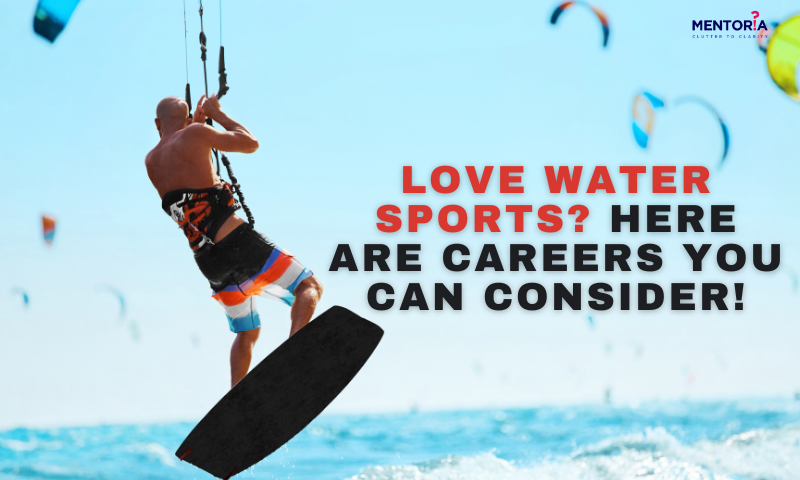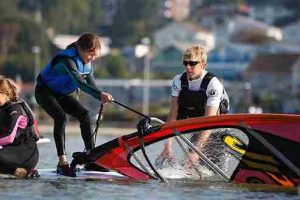Love Water Sports? Here are Careers You Can Consider!

Ahoy there, matey! Are you a water enthusiast looking for an exciting career? Whether you’re a seasoned surfer or a beginner kayaker, there’s a watery world out there waiting for you to explore. And what’s more, we’ve got a treasure trove of water sports careers for you to discover. Dive into the deep end with our list of exhilarating careers, and who knows, you might just find the job of your dreams. So come on, let’s hoist the sails and set a course for adventure!
But got you, you’re thinking if it’s worth it, isn’t it? Well, before we take you to the deep end, let us help you get some clarity on it first!
Is A Career In Water Sports A Good Idea?
Whether pursuing a career in the water sports industry is a good idea depends on your interests, skills, and goals. If you have a passion for water sports and are willing to put in the hard work and dedication required to succeed, then it can be a rewarding and fulfilling career path.
Whether pursuing a career in the water sports industry is a good idea depends on your interests, skills, and goals. If you have a passion for water sports and are willing to put in the hard work and dedication required to succeed, then it can be a rewarding and fulfilling career path.
However, it’s important to consider factors such as job availability, salary, and potential risks and challenges in the field. Ultimately, you should weigh the pros and cons and do your research before deciding whether or not to pursue a career in water sports.
Perks Of Pursuing A Career In Water Sports
There are several advantages to pursuing a career in the water sports industry, including:
- Doing what you love: If you have a passion for water sports, pursuing a career in this field allows you to turn your hobby into a profession.
- Flexibility: Many jobs in the water sports industry, such as surf instructor or kayak guide, offer flexible schedules, which can be ideal if you’re looking for a job that allows you to pursue other interests or hobbies.
- Working in a beautiful environment: Many water sports jobs are located in stunning coastal or tropical locations, which can provide a picturesque and inspiring work environment.
- Meeting new people: Working in the water sports industry can allow you to meet people from all over the world, including fellow water enthusiasts, travellers, and locals.
- Physical activity: Many water sports jobs require physical activity, which can be a great way to stay in shape and maintain a healthy lifestyle.
Overall, pursuing a career in the water sports industry can be a great way to combine your passion for water sports with a fulfilling and rewarding career.
Do I Need To Be A Graduate Or Does Just Having A High School Degree Work?
The education requirements for a career in the water sports industry can vary depending on the specific job and employer. Some jobs, such as surf instructor or kayak guide, may only require a high school diploma or equivalent, along with relevant experience and certifications.
However, other jobs in the water sports industry, such as marine biologist or oceanographer, may require a bachelor’s or even a master’s degree in a related field, such as marine science or biology.
To become a competitive candidate in the water sports industry, it can be helpful to pursue relevant education and training, such as courses in water safety, first aid and CPR, environmental science, or business management.
Additionally, gaining experience through internships or volunteer work can be valuable for building your skills and networking in the industry. Overall, the education and training required for a career in the water sports industry can vary widely depending on the specific job and your career goals.
Scope Of Careers As A Water Sports Enthusiast
You’ll be surprised how many options there are if you’re planning to pursue a career for your love of water sports! Here are some examples:
- Surf Instructor: As a surf instructor, you would teach individuals or groups of all ages and skill levels how to surf, including techniques for paddling, standing up on the board, and riding waves. You would also educate students on ocean safety, wave dynamics, and proper surf etiquette.
- Scuba Diving Instructor: Scuba diving instructors teach individuals how to scuba dive and become certified divers. In addition to teaching basic skills such as equipment use, buoyancy, and underwater communication, you would also lead diving tours, introduce students to local marine life, and provide ongoing education to help divers improve their skills.
- Marine Biologist: As a marine biologist, you would study various aspects of marine life and ecosystems, such as marine mammals, fish, coral reefs, and plankton. This could involve conducting research, analysing data, and communicating findings to other scientists or the public. Some marine biologists work in academic or government settings, while others work in conservation or advocacy organisations.
- Boat Captain: Boat captains are responsible for operating and maintaining boats, such as fishing boats, tour boats, and yachts. This includes navigating waterways, ensuring safety protocols are followed and overseeing any crew members or passengers on board.
- Oceanographer: Oceanographers study the physical and chemical properties of the ocean, such as its temperature, salinity, and currents. This research helps us understand how the ocean impacts climate, weather patterns, and marine ecosystems. Oceanographers may work in government agencies, research institutions, or private companies.
- Kayak Guide: As a kayak guide, you would lead tours through waterways such as rivers, lakes, and oceans. You would instruct participants on proper paddling techniques, safety, and local wildlife, and provide an enjoyable and educational experience.
- Professional Surfer: Professional surfers compete in surfing competitions around the world, and are often sponsored by companies that produce surf gear, apparel, and accessories. Professional surfers must have exceptional skill, physical fitness, and endurance, as well as a strong understanding of wave dynamics and weather patterns.
- Marine Conservationist: Marine conservationists work to protect marine environments and wildlife, often through advocacy and education efforts. They may conduct research, collaborate with other organisations, and work to develop and enforce conservation policies.
- Sailmaker: Sailmakers design, cut, and sew sails for boats and yachts. This requires expertise in materials, construction techniques, and sail design, and involves collaborating with boat owners and captains to ensure the sails meet their specific needs.
- Marine Photographer or Videographer: Marine photographers and videographers capture stunning images and footage of marine environments, wildlife, and water sports. They may work for magazines, travel companies, or stock photo agencies, and must have an eye for composition, lighting, and storytelling.
These are just a few examples of the many diverse and exciting careers available in the water sports industry.
Ready To Turn Your Hobby Into Your Profession? Aye Aye Captain!
In conclusion, pursuing a career in the water sports industry can offer many exciting opportunities for adventure, personal growth, and professional development. While salaries may vary, the chance to work in beautiful and unique environments and connect with like-minded individuals can make this field incredibly rewarding.
If you have a passion for water sports and are considering a career in this industry, it’s important to do your research, gain the necessary education and experience, and stay committed to your goals. And if you’re not sure where to start or need guidance along the way, Mentoria is here to help. Mentoria offers mentorship and guidance to help you achieve your career aspirations and turn your dreams into reality. So, don’t be afraid to follow your dreams and pursue a career in the water sports industry. With the right tools and support, you can make it happen.









